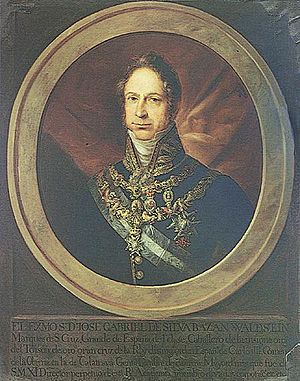José Gabriel de Silva-Bazán, 10th Marquess of Santa Cruz facts for kids
Quick facts for kids
The Most Excellent
José Gabriel de Silva-Bazán
10th Marquess of Santa Cruz GE
|
|
|---|---|
 |
|
| Prime Minister of Spain | |
| In office 24 January 1822 – 30 January 1822 |
|
| Monarch | Ferdinand VI |
| Preceded by | Ramón López Pelegrín |
| Succeeded by | Ramón López Pelegrín |
| Seat L of the Real Academia Española | |
| In office 24 August 1814 – 4 November 1839 |
|
| Preceded by | Vicente González Arnao |
| Succeeded by | Bernardino Fernández de Velasco |
| Director of the Real Academia Española | |
| In office 24 August 1828 – 4 November 1839 |
|
| Preceded by | José Miguel de Carvajal-Vargas |
| Succeeded by | Francisco Martínez de la Rosa |
| Personal details | |
| Born |
José Gabriel de Silva-Bazán y Waldstein
18 March 1782 |
| Died | 4 November 1839 (aged 57) Madrid, Spain |
| Nationality | Spanish |
José Gabriel de Silva-Bazán y Waldstein (born March 18, 1782, in Madrid – died November 4, 1839, in Madrid) was an important Spanish noble. He was known as the 10th Marquess of Santa Cruz de Mudela. He held many significant positions during his life. He was the first director of the famous Prado Museum in Madrid from 1817 to 1820. He also served as a high-ranking official in the royal household, called a Mayordomo mayor, between 1822 and 1823.
Contents
Life and Career
José Gabriel de Silva-Bazán came from a noble family. He was a direct descendant of Álvaro de Bazán, 1st Marquess of Santa Cruz, a famous Spanish admiral. His father was José Joaquín de Silva-Bazán, the 9th Marquess of Santa Cruz. His mother was Mariana de Waldstein from Austria.
Important Roles and Honors
José Gabriel de Silva-Bazán held many important roles in Spain. He was a senator, which is like a member of parliament. He also received high honors, such as being a Knight in the Order of the Golden Fleece in 1821. This is one of the most important orders in Europe. He was also a Knight in the Order of Calatrava and the Order of Carlos III.
He served King Ferdinand VII of Spain in several close roles. He was a Gentilhombre, Mayordomo mayor, and Sumiller de Corps. These were important positions in the royal court. He was also part of the council that ruled Spain when Queen Isabella II of Spain was a child.
Diplomatic Missions
José Gabriel de Silva-Bazán also worked as a diplomat. He was the Spanish Ambassador in Paris, France. He was also sent as a special envoy to London for the coronation of King George IV of the United Kingdom. This shows his importance in international relations.
Director of the Prado Museum
One of his most notable achievements was becoming the first director of the Prado Museum in 1817. This museum is one of the most famous art museums in the world. Before the Peninsular War, his father had already convinced King Charles IV not to destroy some paintings. These paintings were considered "obscene" by the previous king, Charles III. Instead, they were stored in a private collection.
After the war, Queen Maria Isabel of Braganza helped create the Prado Museum. José Gabriel de Silva-Bazán was chosen to lead it. He was replaced as director by his brother-in-law, Pedro de Alcántara Téllez-Girón, during a period of political change called the Liberal Triennium. However, he continued to help keep the museum's collection safe during uncertain times.
Prime Minister of Spain
For a short time, José Gabriel de Silva-Bazán even served as the Prime Minister of Spain. He held this important position for six days in January 1822. He was also the director of the Real Academia Española, which is an important institution for the Spanish language.
Family Life
In 1801, José Gabriel de Silva-Bazán married Joaquina Téllez-Girón, Marchioness of Santa Cruz. She was the daughter of important nobles, the 9th Duke of Osuna and the 12th Countess-Duchess of Benavente. Joaquina was famously painted by the renowned Spanish artist Francisco Goya.
They had four children together:
- Joaquina (1802–1876), who married Pedro de Alcántara Álvarez de Toledo y Palafox.
- Inés (1806–1865), who married Nicolás Osorio y Zayas.
- Fernanda María (1808–1879), who married Andrés Avelino de Arteaga Lazcano y Carvajal.
- Francisco de Borja (1815–1889), who became the 11th Marquess of Santa Cruz after his father.
=Images for kids
Sources
- Museo del Prado
- Medinaceli
See also
 In Spanish: José Gabriel de Silva-Bazán para niños
In Spanish: José Gabriel de Silva-Bazán para niños
 | Selma Burke |
 | Pauline Powell Burns |
 | Frederick J. Brown |
 | Robert Blackburn |




